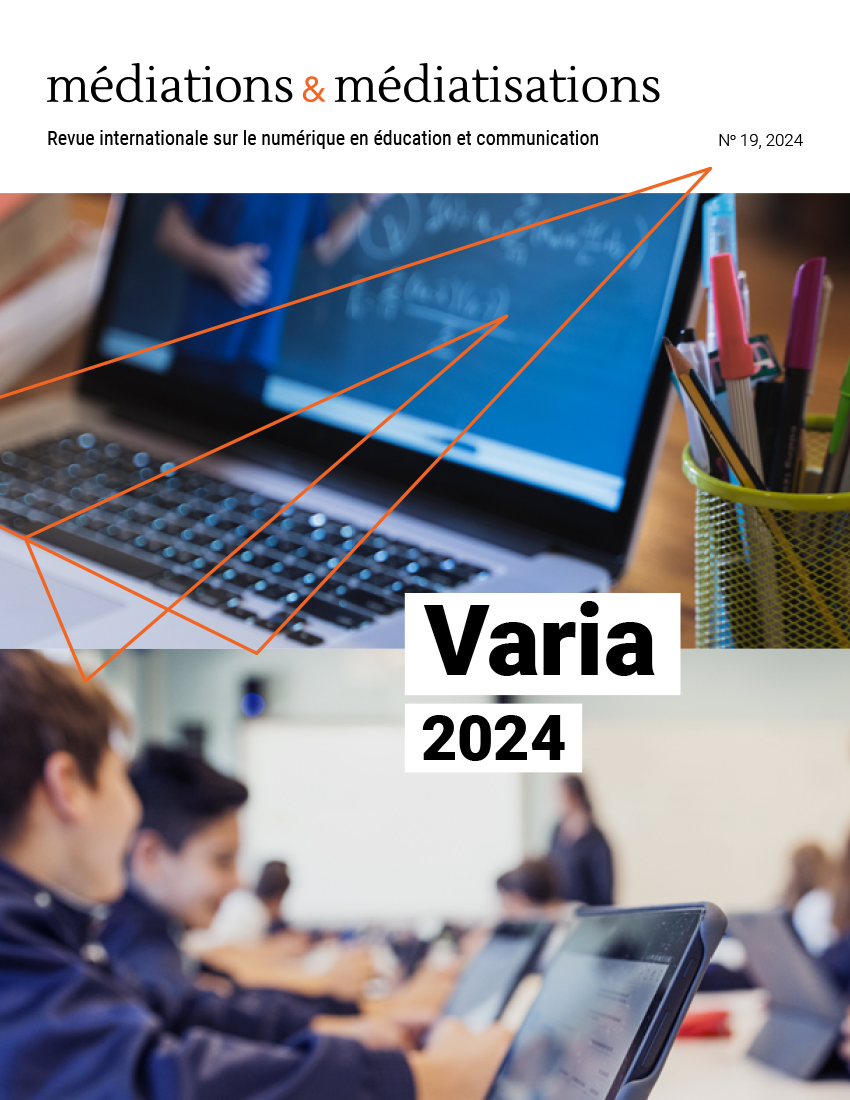Le syllabus de cours, un instrument au service de l’apprentissage et de l’enseignement
Contenu principal de l'article
Résumé
Cet article présente les résultats d’une recherche mixte menée à l’Université Côte d’Azur (France) autour de la mise en place des syllabus numériques. En tant qu’instruments au service de l’apprentissage des étudiants, les syllabus (ou plans de cours) sont susceptibles de favoriser une représentation convergente des intentions pédagogiques des enseignants et de la perception de celles-ci par les étudiants. Cette recherche rend compte des représentations que se font des syllabus les étudiants et les enseignants interrogés (par questionnaires et entretiens semi-directifs) et de leur perception du dispositif mis en place dans leur université. Les résultats mettent en lumière une divergence de point de vue entre les projections des enseignants et les attentes des étudiants. Ils soulignent la nécessité d’une meilleure compréhension des besoins des étudiants et de l’élaboration d’une représentation partagée de l’environnement d’apprentissage pour favoriser une expérience d’apprentissage réussie.
Téléchargements
Renseignements sur l'article

Cette œuvre est sous licence Creative Commons Attribution - Pas d'Utilisation Commerciale - Partage dans les Mêmes Conditions 4.0 International.
Références
Cullen, R. et Harris, M. (2009). Assessing learner-centredness through course syllabi. Assessment & Evaluation in Higher Education, 34(1), p. 115-125. https://doi.org/10.1080/02602930801956018
Depover, C., Karsenti, T. et Komis, V. (2018). La recherche évaluative. Dans T. Karsenti et L. Savoie-Zajc (dir.), La recherche en éducation (p. 269-287). Presses de l’Université de Montréal.
Deschryver, N. et Charlier, B. (dir.) (2012). Dispositifs hybrides. Nouvelles perspectives pour une pédagogie renouvelée de l’enseignement supérieur. Rapport final. https://archive-ouverte.unige.ch/unige:23102
Entwistle, N. (2018). Student learning and academic understanding. A research perspective with implications for teaching. Academic Press.
Garavalia, L. S., Hummel, J. H., Wiley, L. P. et Huitt, W. G. (2000). Constructing the course syllabus: faculty and student perceptions of important syllabus components. Journal on Excellence in College Teaching, 10(1), p. 5-21. http://www.edpsycinteractive.org/papers/cons-course-syll.pdf
Gavillet, I. (2010). Michel Foucault et le dispositif : questions sur l’usage galvaudé d’un concept. Dans V. Appel, H. Boulanger et L. Massou (dir.), Les dispositifs d’information et de communication. Concepts, usages et objets (p. 17-38). De Boeck.
Jézégou, A. (2007). La distance en formation. Premier jalon pour une opérationnalisation de la théorie de la distance transactionnelle. Distances et savoirs, 5(3), 341-366. https://www.cairn.info/revue-distances-et-savoirs-2007-3-page-341.htm
Könings, K. D., Seidel, T., Brand-Gruwl, S., Van Merriënboer, J. J. G. (2014). Differences between students’ and teachers’ perceptions of education: profiles to describe congruence and friction. Instructional Science, 42, 11-30. https://doi.org/10.1007/s11251-013-9294-1
L’Écuyer, R. (1990). Méthodologie de l’analyse développementale de contenu : méthode GPS et concept de soi. Presses de l’Université du Québec.
Leduc, L. (2013). Rédiger des plans de cours. De la théorie à la pratique. De Boeck.
Moore, M. G. (1993). Theory of transactional distance. Theoretical principles of distance education, (1), 22-38.
Paquelin, D. et Bois, C. (2021). De l’alliance thérapeutique à l’alliance pédagogique : l’essence d’une collaboration éducative. Questions vives, (36). https://doi.org/10.4000/questionsvives.6374
Peltier, C., Dufour, J. et Parent, K. (2021). Syllabus et plans de cours à l’Université Côte d’Azur et à l’Université Laval : étude de cas croisée de deux formes de « contrats pédagogiques » sous l’angle de la réussite étudiante. Université Laval. https://archive-ouverte.unige.ch/unige:170278
Prosser, M. et Trigwell, K. (1999). Understanding Learning and Teaching. The Experience in Higher Education. Society for Research into Higher Education.
Ramsden, P. (1988). Context and strategy: situational influences on learning. Dans R. R. Schmeck, (dir.), Learning strategies and learning styles (p. 159-184). Plenum Press.
Richmond, A. S., Morgan, R. K., Slattery, J. M., Mitchell, N. G. et Cooper, A. G. (2019). Project syllabus: an exploratory study of learner-centered syllabi. Teaching of psychology, 46(1), 6-15. https://doi.org/10.1177/0098628318816129
Richmond, A. S., Slattery, J. M., Mitchell, N., Morgan, R. K. et Becknell, J. (2016). Can a learner-centered syllabus change students’ perception of student-professor rapport and master teacher behaviors? Scholarship of teaching and learning in psychology, 2(3), 159-168. http://doi.org/10.1037/stl0000066
Vermunt, J. D. et Verloop, N. (1999). Congruence and friction between learning and teaching. Learning and Instruction, 9(1999), 257-280. https://doi.org/10.1016/S0959-4752(98)00028-0

